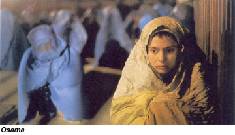|
|
||||
|
|
by Donald Levit  The surprise would be that, if only initially for propaganda purposes, Osama is not picked up and distributed here, for it is totally anti-Taliban, picturing those deposed but not forgotten fanatics as brutally misogynist, intolerant and anti-life. That the film happens to be good, into the bargain, should not hurt, either. Afghanistan has produced fewer than forty short and feature works-ever -- and, made with Iranian financial and technical help and the only 35 mm camera in the entire country, an Arriflex B.L. 4, Osama is the first entirely Afghani film since prior to the radical Sunni Taliban's 1996 eruption from Kandahar. This début feature from formerly exiled Siddiq Barmak is neat and tidy, not too long, more sharply focused and intelligent than many another cash-challenged indie, or big-budgeter for that matter. Far from the boy-actor-as-girl-disguised-as-boy staple of Elizabethan comedy or star-vehicle song schmaltz of Yentl (which appalled author Isaac Bashevis Singer), this simple tale of a twelve-year-old (Marina Golbahari) forced to assume the part of a boy is unrelentingly shocking in its portrayal of religion and ancient culture gone to the bad. From the scarred dilapidated houses, hospitals and dry, cement-dusted streets of Kabul, to the joyless, silent, beautiful face of that girlchild, the film is a sobering dash of cold water like the primitive baths that are depicted. Charming street urchin and hustler Espandi (Arif Herati) is our introduction and stage-manager, though that rôle subsides imperceptibly as he metamorphoses into a character, the girl's champion. Speaking into the camera, which functions as a faceless man occasionally doling out dollars like John Huston in his own The Treasure of the Sierra Madre, the boy swings a makeshift censer which, with a donation "in the name of the Painter King and the Samarkand girls, keeps all misfortune away." "The women are having a demonstration" for the right to work, he invites, but as black-clad thugs drive in to hose and disperse marchers swathed in blue burkka's, he yells at us to "Run! Are you crazy!" Afterwards, a woman arrives for work in a non-equipped hospital where the sole oxygen cylinder mask is passed from patient to patient. Her husband Rahim killed in "the Kabul war," her brother in "the Russian war," she has only her mother and the frightened daughter clinging to her skirts. But her home patient dies, Taliban raid the hospital and Sharia law forbids females to work, show their feet or go outside without recognized male accompaniment. Desperate, she heeds as her wrinkled mother soothes the granddaughter with a repeated tale of boys who became girls, and vice versa, by passing under a rainbow ("What's a rainbow?" asks the youngster). The girl's braids are shorn -- touchingly planted to grow in a dusty flowerpot -- she is dressed loosely as the opposite sex and so can work in the shop of her father's old companion-in-arms. Timid and watched by a handsome black-bearded Taliban, she arrives one morning to find the shopkeeper fled, his blankets left as a present. Worse, along with Espandi and most boys, she is rounded up for Madrassa religious and military school -- "Bin Laden's training us for war!" -- where her failure of boisterous courage results in teasing, where she is trained in ritual ablutions under the male genitalia, and Espandi becomes her defender who claims that she is Osama (to my ears, accented on the last syllable: oh-sah-MAH). But even that wily protector cannot help. Hanged into a well as a sissy, she weeps for "Mom!" and is betrayed by menstrual blood. Imprisoned, dreaming of skipping rope, she confronts a Mullah who nonchalantly sentences to death a foreign photographer -- who cannot find a single match for his cigarette and whose rickety camera condemns him -- and an adulteress, who is stoned, but capriciously spares the exposed girl's life. Instead, the child is given to a goatish Mullah who hums religious snatches, glories in torturous chastity belts, is hated by his powerless three wives and children, and donkey-carts her away to his isolated house. A viewer or two thought the ending abrupt, but, really, how much further downhill can events go? One would like to believe that, when things are darkest, etc., etc. If so, this path will be long and hard, for eons of backwardness, repression, hatred and ignorance must be overcome, and Kabul is not the only place. A "tribute to the women of Afghanistan," greeted with ovations and three prizes at Cannes, and featured at Telluride and Toronto, Barmak's subtitled (from Dari Farsi), all amateur-cast film is an eye-opening start. Less tenderly than Samira Makhmalbaf's fine first sequence of 09'11'01 [September 11], Osama distressingly, cruelly -- and in some way, beautifully -- brings home the horrible daily reality of millions, with its script based on a newspaper account. Barmak is currently chairman of the Afghan Children's Education Movement: the task facing him -- and us -- is urgent and monumental. (Osama won the Golden Globe for Best Foreign Language Film of 2003. Released by United Artists; not rated by MPAA.) |
||
|
© 2026 - ReelTalk Movie Reviews Website designed by Dot Pitch Studios, LLC |



